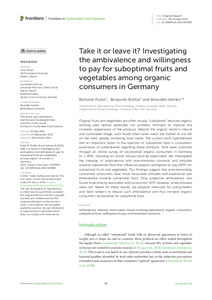| dc.date.accessioned | 2022-10-27T11:09:21Z | |
| dc.date.available | 2022-10-27T11:09:21Z | |
| dc.date.issued | 2022-10-06 | |
| dc.identifier | doi:10.17170/kobra-202210277043 | ger |
| dc.identifier.uri | http://hdl.handle.net/123456789/14220 | |
| dc.description.sponsorship | Gefördert durch den Publikationsfonds der Universität Kassel | ger |
| dc.language.iso | eng | ger |
| dc.rights | Namensnennung 4.0 International | * |
| dc.rights.uri | http://creativecommons.org/licenses/by/4.0/ | * |
| dc.subject | ambivalence | ger |
| dc.subject | attitude | ger |
| dc.subject | food waste | ger |
| dc.subject | mouse-tracking experiment | ger |
| dc.subject | organic consumers | ger |
| dc.subject | suboptimal food | ger |
| dc.subject | willingness to pay | ger |
| dc.subject | environmental concerns | ger |
| dc.subject.ddc | 580 | ger |
| dc.subject.ddc | 630 | ger |
| dc.title | Take it or leave it? Investigating the ambivalence and willingness to pay for suboptimal fruits and vegetables among organic consumers in Germany | eng |
| dc.type | Aufsatz | |
| dcterms.abstract | Organic fruits and vegetables are often visually “suboptimal” because organic farming uses neither pesticides nor synthetic fertilisers to improve the cosmetic appearance of the produce. Despite the organic sector's natural and sustainable image, such foods often never reach the market or are left on the shelf, greatly increasing food waste. The current work hypothesised that an important factor in the rejection of suboptimal food is consumers' experience of ambivalence regarding these products. Data were collected through an online survey of (occasional) organic consumers in Germany (n = 493), including an online mouse-tracking experiment. We investigated the interplay of ambivalence with environmental concerns and attitudes towards suboptimal food that influence people's willingness to pay (WTP) for suboptimal fruits and vegetables. Our findings suggest that environmentally concerned consumers have more favourable attitudes and experience less ambivalence towards suboptimal food. Only subjective ambivalence was found to be directly associated with consumers' WTP, however, while attitudes were not. Based on these results, we propose measures for policymakers and food retailers to reduce such ambivalence and thus increase organic consumers' acceptance for suboptimal food. | eng |
| dcterms.accessRights | open access | ger |
| dcterms.creator | Puteri, Berlianti | |
| dcterms.creator | Buttlar, Benjamin | |
| dcterms.creator | Jahnke, Benedikt | |
| dc.relation.doi | doi:10.3389/fsufs.2022.934954 | |
| dc.subject.swd | Deutschland | ger |
| dc.subject.swd | Biologische Landwirtschaft | ger |
| dc.subject.swd | Lebensmittelabfall | ger |
| dc.subject.swd | Abfallvermeidung | ger |
| dc.subject.swd | Verbraucherverhalten | ger |
| dc.subject.swd | Online-Befragung | ger |
| dc.subject.swd | Kaufverhalten | ger |
| dc.type.version | publishedVersion | |
| dcterms.source.identifier | eissn:2571-581X | |
| dcterms.source.journal | Frontiers in Sustainable Food Systems | eng |
| dcterms.source.volume | Volume 6 | |
| kup.iskup | false | |
| dcterms.source.articlenumber | 934954 | |


